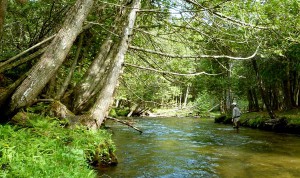Don’t Fence Me In

Limiting Public Land Jeopardizes Michigan’s Character
Nobody’s going to confuse it with Chicago or Denver, but Lansing is an honest-to-God city, albeit mid-sized. We’ve got a decent food scene, a solid bus system, skyscrapers—even our own professional ball club.
It’s a great place to work. But like Melville’s Ishmael when he was away from the sea awhile, if I’m too long in town without at least a brief escape to the woods, “it requires a strong moral principle to prevent me from deliberately stepping into the street, and methodically knocking people’s hats off.”
Luckily, a couple of years ago I discovered a secret spot on a little trout creek about an hour southwest of my home in East Lansing. (I’m not divulging details. Unless you buy me a Two Hearted Ale—then I’ll tell you exactly where it is.)
I’d heard someone sing the creek’s praises at my local fly shop, so I gave it a shot. On a whim, I parked where it flows through a state wildlife area. The place was incredible! The creek was tiny, ice-cold and clear. It was surrounded by wetlands and lined with tamaracks and alders, just like the northern streams I grew up fishing. After just a few casts, amazingly, a small brown trout took the first dry fly I ever tied, a Griffith’s gnat. Three more followed.
Needless to say I’ve been back to my secret spot many times since. In spring and summer, my fishing buddy and I head down there after work whenever we can. We see owls in the trees and watch woodcock doing their whirligig dance above the water. We shriek like maidens fair when beavers slap their tails on the water. The hatches of aquatic insects—trout hors d’oeuvres that indicate a healthy stream—are thick. And even though you could just about spit across the creek, we haul some pretty serious fish out of it. We lose a lot more.
I’m immensely lucky to have such a great place within easy reach, but it also strikes me as a pretty fundamental benefit of living in a state so blessed with natural resources. All Michiganders ought to have a public park, forest or waterway near their home, where they can get away for a few hours. It’s also central to Michigan’s culture and character—and economy—that those of us downstate have ample opportunities for longer trips to the deeper woods and wilder waters Up North.
That’s what’s so upsetting about the attempt by Senator Tom Casperson and his allies to put an arbitrary cap on how much land the state can own. MEC’s Brad Garmon has written an excellent overview of how Casperson’s proposal would jeopardize the Pure Michigan image touted on TV spots across the country. And as the Detroit Free Press wrote in its editorial,
“…perception of public land ownership is vastly different from north to south in Michigan, with UP residents feeling surrounded by it and those in the southern counties feeling as if they have to drive miles to find themselves in natural surroundings. A cap might someday even preclude downstate acquisitions, a terrible price to pay for UP concerns about too much public land… Pure Michigan campaigns certainly rely on that image of broad access to nature. Out-of-staters’ perception might even be further enhanced by more DNR-held land than the currently envisioned cap would allow.”
The Senate already approved Casperson’s proposal, and the House Natural Resources, Tourism and Outdoor Recreation Committee is expected to vote on it next week. It’s critical that hunters, anglers, birders, snowmobilers—heck, anyone who likes a little elbow room—tell the Legislature that having abundant public recreational lands that everyone can access is what makes Michigan so special.
As Aldo Leopold said in his classic, A Sand County Almanac, “There are some who can live without wild things, and some who cannot.”
Let’s not let Senator Casperson and his allies speak for those of us who cannot.
Want to take action? Call Representative Frank Foster (Chair of the Natural Resources committee, 517-373-2629) and your own representative. Ask them to support public land in all of Michigan by voting no on SB 248, the land cap bill. You might also call Senator Tom Casperson, (517) 373-7840 and ask him to please stop attacking public land opportunities and responsible land management throughout Michigan.
Comments are closed.



How do I find out what specific land are included in the northern Michigan consolidation piece that won’t be funded? Any in the Pigeon River Country State Forest?